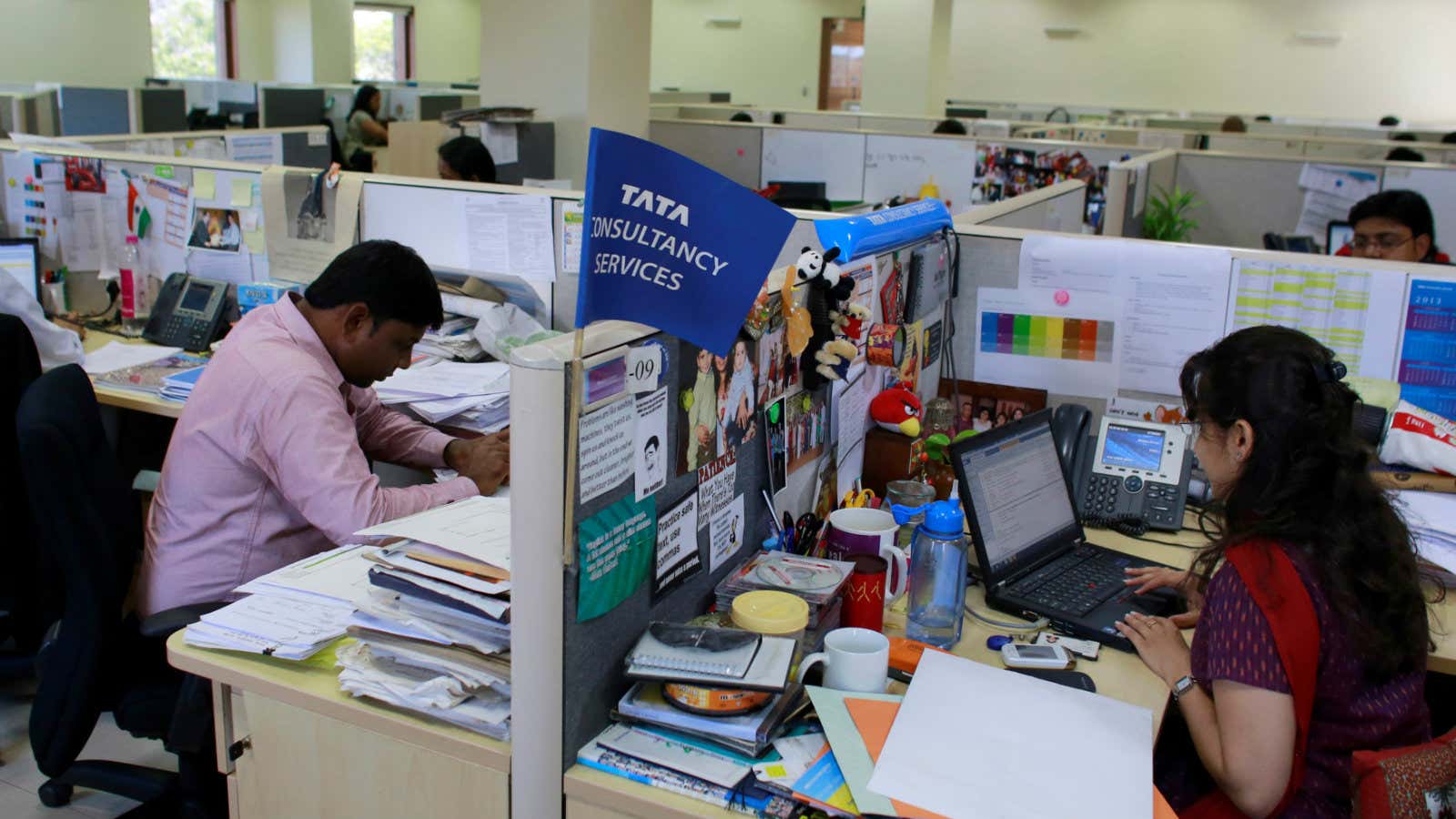While the $150 billion Indian IT industry has gone into turmoil owing to creeping automation, market leader Tata Consultancy Services (TCS) has been silently recalibrating its strengths and focus.
This year, the Mumbai-based firm carved out a separate unit to impart skills in new technologies to employees, Janardan Santhanam, head of digital talent development, TCS, told Quartz. With 387,223 employees across 55 countries, TCS’s primary goal is to make them “digitally savvy to some extent,” Santhanam said.
He, of course, brushes aside the fears of robots taking over jobs, dubbing them an “exaggeration.” It is merely the next level after the past few decades of digitisation, he says.
Indeed, the Indian IT industry itself is a product of disruption brought about by technology. ”The IT industry that currently employs hundreds of thousands of workers, for example, sprang up essentially overnight, and has been adapting to new systems and methods every time a new technology is invented that impacts the technology industry,” explained Harel Tayeb, CEO of New Jersey-based Kryon Systems, a firm that provides robotic process automation services.
So, instead of worrying about the inevitable, TCS has chosen to negotiate the rapidly emerging tech landscape.
Re-skilling at TCS
Most of the new IT spending by TCS’s clients goes towards digital technologies, and the company provides digital services to over 55% of its customers, according to its annual report for financial year 2017. These digital services include “social media, mobility, analytics, big data, cloud, artificial intelligence, and internet of things.”
In 2016-17, digital technologies earned TCS $3 billion in revenue, which is 16% of the total income it earned that year. This was 29% more than TCS’s 2015-16 figure for digital technologies.
With demand evidently growing, TCS has trained 200,000 employees until now in over 600,000 competencies in digital technologies, the annual report (pdf) notes.
The skilling process is meant for both fresh engineering graduates and experienced employees. From among the latter, the company picks candidates based on market demand and client specifications. It takes stock every quarter and, often, employees with some contextual knowledge of the skills are chosen.
“For instance, if you talk of big data, which is popular in the industry today, someone with good business intelligence background will be a good candidate to re-skill on big data,” Santhanam explained.
The in-demand skills include those required for DevOps roles (a combination of development and operations) and agile technology-based frameworks.
“Under a DevOps model, development and operations teams are no longer ‘siloed.’ Sometimes, these two teams are merged into a single team where the engineers work across the entire application lifecycle, from development and test to deployment to operations, and develop a range of skills not limited to a single function,” according to Amazon Web Services.
Agile technology is different from the traditional rigid paradigms of software development like the waterfall model or V-model that took months for delivery. It splits a project’s workload between teams over short periods, making alterations based on rapid feedback.
TCS has also moved away from time-bound training processes, common in the past. It is adopting perpetual learning, without time limits, Santhanam said.
Effect on hiring
This new focus on re-skilling has reduced TCS’s reliance on lateral hiring, or recruiting experienced persons.
One of the largest private employers in the country, and the world’s third-largest in the tech sector, TCS’s hiring dropped from 90,812 employees in 2015-16 (pdf) to 78,912 persons in 2016-17. “We are reducing our reliance on always going outside for digital skills and are developing a critical mass internally,” Santhanam said.
However, the demand for specialised skills is bigger than the supply. For instance, between 2014 and 2017, the demand for talent in the Indian IoT space increased by 304%, a talent supply index developed by Belong, a tech-based outbound hiring services platform, shows. The shortage is mostly of DevOps engineers and data scientists, the index for June 2017 shows. “This trend will only accelerate with more companies investing aggressively in cloud and emerging technologies like AI, while supply struggles to keep pace,” Belong co-founder Vijay Sharma said in an e-mailed note.
Meanwhile, lateral hiring at TCS is strictly focused on niche skills that it hasn’t worked on or expertise in areas where it lacks the bandwidth to train.
“We do hire a few individuals where required, but remember, there just won’t be sufficient people (in the market) with skills in newer technologies…On the scale at which we operate, there are no shortcuts to capability development. We have to do what we have always done—invest in re-skilling our employees,” Ajoy Mukherjee, EVP, human resources, TCS, said in the company’s 2016-17 annual report.
Overhauling the interview process
TCS hasn’t completely given up on young blood.
Playing down the perception that Indian engineering graduates are mostly ill-equipped, the company has collaborated with many colleges to participate in curriculum development and teaching.
“It is wrong to paint a broad brush saying that quality is not good,” Santhanam said.
Typically, during the last semester of engineering courses, the firm upgrades the curriculum to ensure that its fresh hires are digitally focused.
So, while there hasn’t been any impact on the number of fresh graduates it recruits, the way they are recruited has changed. “The interviewing, the selection process (for freshers), and the manner in which we are up-skilling them even before they enter our company, has totally become digital-focused,” Santhanam said.
Clearly, TCS is transforming itself. The Indian IT industry can take note.
